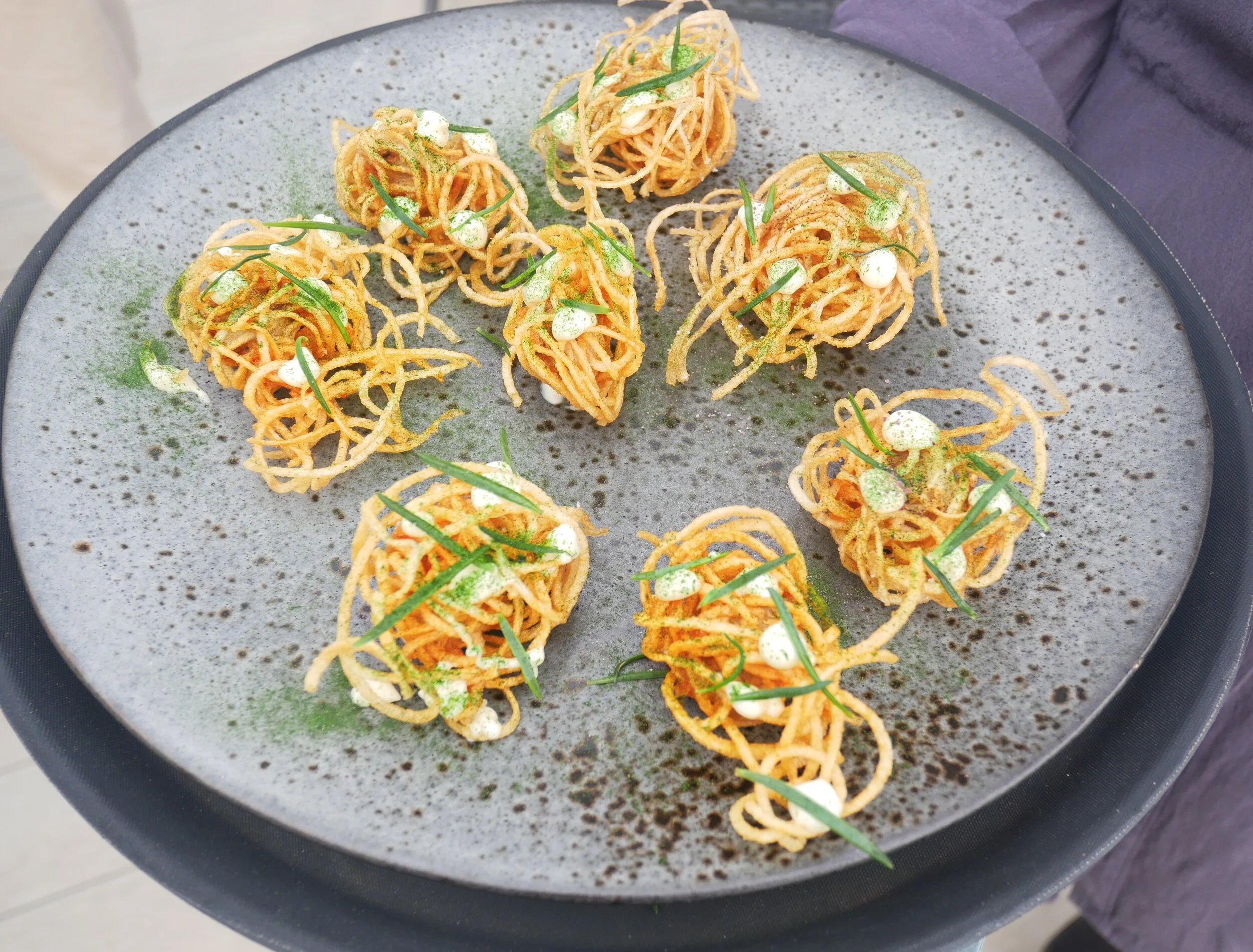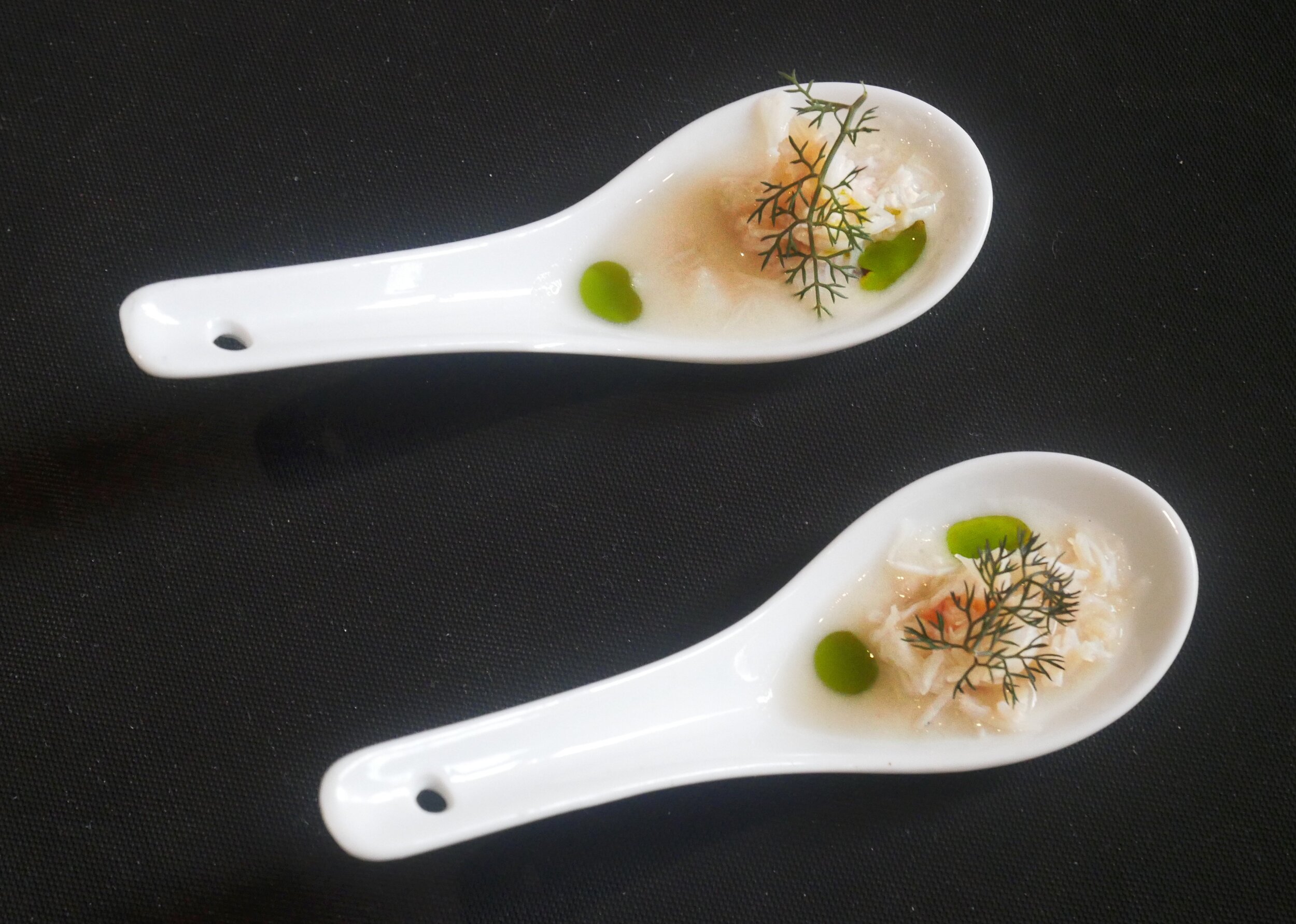Mezze
The more I research the subject of food and drink, the larger and louder the question arises… Why didn’t we do that?
It began a few years ago when the award-winning West Dorset chef Mark Hix and I were discussing the concept of pesto and he showed me how to make a West Country version with extra virgin rapeseed oil, wild garlic, local cobnuts and some scraps of dried-out ultra-mature Somerset cheddar.
Simple and very, very, delicious. But why didn’t West Country folk always make such a wonderful and easy-to-make sauce out of these locally sourced odds and ends, I wondered?
Dining out early evening in Sardinia
And I’ve been wondering such things ever since - including a couple of weeks ago in these pages when we featured bottarga, or “Sardinian gold”, made of salted grey mullet roe. Plenty of grey mullet are caught around West Country coasts, but when was the last time you heard of anyone doing anything with the roe - let alone processing it to the extent that it becomes as expensive as caviar?
Mark Hix got me thinking about why we do not do certain basic foods in the UK
I’m not talking here about some fancy exotic style of food preparation that you could only do in a hot country with special ingredients like strange fish, tropical fruits, and so on… I’m interested in very basic techniques which utilise ingredients that we either share or have our own version of
The BBC Archer’s ex-agricultural advisor, Graham Harvey, and I were discussing the conundrum one day and he reckoned it was all to do with the big disconnect from the land which occurred after the UK Inclosure Acts and during this nation’s race towards industrialisation.
It’s a fascinating theory, and one which I believe to be true. It would certainly help explain the mystery behind today’s food feature - the question why we don’t have a tradition of serving tapas or mezze style dishes in the UK. I was pondering this recently after the postman shoved a parcel though my letterbox containing a tome called The Mezze Cookbook, Sharing Plates fro the Middle East (published by Phaidon).
Sharing plates - or small platters of this, that, and the other - are part of the traditional cuisine in a great many countries and they offer an interesting, inclusive, friendly and usually delicious and varied way to have lunch or supper. Which is why things like tapas and mezze based restaurants are coming so hugely popular in the UK. Five out of six London restaurants I’ve dined at this year specialised in sharing plates.
But why weren’t the British up for a bit of sharing down the centuries? Why did we eschew the idea of lots of little plates being brought to the table in a continuous timeline throughout an evening of communal merriment - and go for the bung-it-all-on-one-plate-per-diner model instead?
A simple plate of Menorca fries with a sauce makes the sort of mezze I could do with right now
Maybe the answer lies in those dreadful Inclosure Acts. One imagines that tapas or mezze came about because peasant folk in countries as diverse as Spain, Greece or Lebanon would collect anything that was edible, either in their little fields or orchards or out in the countryside or along the coast. Whatever they brought home would be prepared to its best advantage - and often that means just having the thing by itself without it being used as a sub-ingredient in some complex final dish.
This partly explains why tapas or mezzes are so popular today - they tend to be simple fresh food, cooked simply - which is so often a winning formula.
Anyway, you can’t imagine the poor ex-peasant factory workers who had been banished from their fields doing much food collecting in their newly urban lives. So the land enclosures, which robbed the poor to give to the rich, eventually gave rise to the Industrial Revolution, which in turn brought about the concept of industrialised food.
And so the simple combo of meat-and-two-veg became the order of our culinary day - and we were able to build a technologically-driven British Empire on the back of the fact that our workers needed to devote very little time to their nutrition or food preparation. Which may have turned the world map pink, but didn’t do any favours to our culinary traditions in these islands.
Now, though, we are busy trying to retrieve the situation. Just look at the number of food based TV programmes there are. Most national weekend newspapers nowadays feature photos of food and promises of recipes on their front pages.
And sharing plates - or mezzes, tapas, whatever you call them - are offering a new way of providing food for our family and friends.
Here’s what food writer Salma Hage has to say about mezze: “In today’s modern world, whether in the East or the West, making lots of smaller dishes to share is a brilliant way of eating. Many of the dishes can be prepared in advance, and they can easily be mixed and matched to make a meal that suits you.
“People with different diets, be they gluten free or vegetarian, can all be accommodated,” she adds. “You can prepare a full mezze feast for your loved ones, and keep the dishes coming like there is no tomorrow - or make a smaller selection and eat them at the beginning of a meal. Some home marinated olives and a falafel make an excellent starter.
“Mezze is a mixture of traditions,” she says. “Sharing food, celebrating being together, having plenty on the table, and welcoming new faces - showing how the philosophy of this age-old way of eating resonates to this day.”
At this point you’re maybe be thinking that the making of lots of little sharing plates means preparing a dozen meals instead of one. But the way I see it’s more about dividing the way you deliver the food.
For example, a classic English Sunday roast (which I love and will never cease to prepare and enjoy) can actually be a number of potential dishes which are all shoved onto one big plate.
You could, if you wished, turn it into a number of mezze-style sharing platters. The crispy roast potatoes could be dressed with the delicious lemony seed-mix called za’tar, and served in an attractive dish. The Yorkshire pudding could be flavoured and used with a pungent dipping sauce made from the chicken juices. Fried chicken nuggets could be dipped into a garlicky bread sauce. The different vegetable could be dressed with homemade dips and the like you have stored in your fridge.
It’s partly about deconstructing the various ingredients and serving them more or less alone to shine in their own right. It works. It is a revelation. And it can be easy to do.
I know because I’ve been basing our family meals on the Mezze Cookbook for the past fortnight. With the sad result that I’ve probably put on weight. So no, I won’t always be sub-dividing my food in future - but it is a very good and rather clever thing to have in your culinary armoury.
The Mezze Cookbook, Sharing Plates from the Middle East, by Salma Hage, is published by Phaidon, price £24.95.
Three recipes from The Mezze Cookbook by Salma Hage
Blood Orange and Pistachio Turkish Delight
Shakshuka
“This is what I think of when I want to conjure up a Middle Eastern breakfast,” writes Salma Hage.”It’s a one-pan dish, so it’s easy to prepare, hearty, and rich; just as home on the mezze table as it is at the beginning of the day. If I have roasted peppers around, I’ll often coarsely chop them and stir them in with the tomatoes.
preparation time: 10 minutes
cooking time: 45 minutes
serves: 4
olive oil, for frying
1 red onion, finely chopped
2 sweet pointed (Romano) red peppers, seeded and cut into 1-inch (2-cm) dice
3 garlic cloves, finely chopped
1 small bunch coriander leaves picked and stalks finely sliced
1/2 teaspoon Lebanese 7-Spice seasoning
1/2 teaspoon chilli powder
1 tablespoon coriander seeds, coarsely bashed in a pestle and mortar
1 teaspoon hot smoked paprika
7 oz/200 g mixed cherry tomatoes, halved
1 (14-oz/400-g) can chopped tomatoes
1 teaspoon caster sugar
4 eggs
4 teaspoons thick Greek yogurt
salt and pepper
toasted flatbreads, to serve
PREPARATION
Heat a generous splash of olive oil in a skillet or frying pan over medium heat. Add the onion and a pinch of salt and cook for 8–10 minutes, until soft and sweet. Stir in the peppers, garlic, and chopped coriander stalks and cook for a further 5 minutes, until the pepper is starting to soften and take on some colour. Push the peppers and onion to the side of the pan, then add the spices to the exposed pan. Toast for 1 minute, then stir through the pepper and onion. Add the cherry tomatoes and stir to combine. Cook for another 5 minutes, until you feel the tomatoes begin to soften. Add the chopped tomatoes and sugar, and turn the heat down to medium–low. Simmer for 15 minutes, to let the flavours develop and the sauce thicken.
Make four little wells in the mixture and crack in the eggs. Turn the heat up to medium–high and cook the eggs for 6–8 minutes until the whites are set. If necessary, cover the pan with a lid to cook the eggs through.
Dot the yogurt around the pan and scatter over the coriander leaves. Serve with toasted flatbreads at the centre of your mezze table.
Lentil and Bulgur Wheat M’juderah
M'juderah is a gentle and calming combination of lentils and spiced, crispy onions.
Preparation time: 10 minutes + 30 minutes + soaking time - cooking time: 40–45 minutes
serves: 4
1/2 cup (3 1/2 oz/100 g) coarse bulgur wheat
4 tablespoons sunflower oil
5 onions: 3 sliced and 2 cut into rings
1 1/4 cups (9 oz/250 g) dried
Puy or green lentils, rinsed
1/2 teaspoon ground cumin
1/2 teaspoon ground coriander
1 teaspoon Lebanese 7-Spice Seasoning
salt and pepper
PREPARATION
Soak the bulgur wheat in boiling water for 30 minutes, then drain and squeeze out any excess water.
Heat 1½ tablespoons of sunflower oil in a large skillet or frying pan over medium heat. Add the sliced onions and sauté for about 20 minutes, until soft and golden.
Add the lentils and the spices to the onions, then sauté for another minute. Cover with 2 ½ cups (20 fl oz/600 ml) of boiling water, and cook for about 20 minutes, until the lentils are tender (adding more water, if necessary).
Add the bulgur wheat to the pan and stir to combine. Season well with salt and pepper, then set aside and keep warm.
Heat the remaining 2 1/2 tablespoons of sunflower oil in a large skillet or frying pan over medium heat. Add the onion rings and sauté for about 8 minutes, until crispy and caramelised. Drain on paper towels.
Serve the m’juderah topped with the crispy onion rings.
















